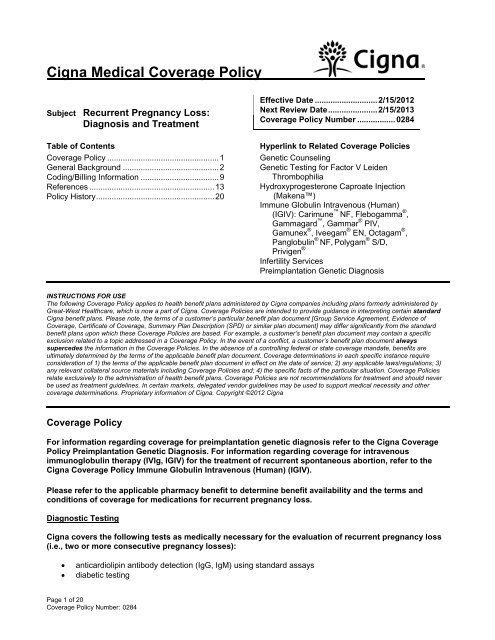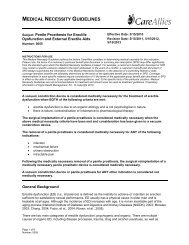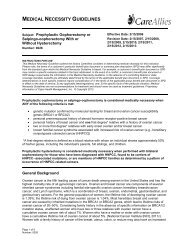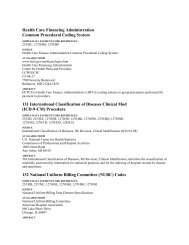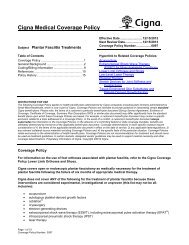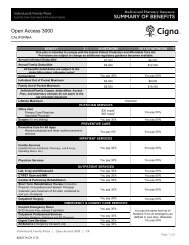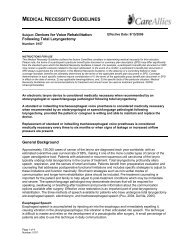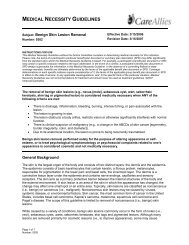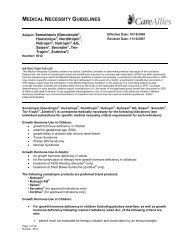Recurrent Pregnancy Loss - Cigna
Recurrent Pregnancy Loss - Cigna
Recurrent Pregnancy Loss - Cigna
- TAGS
- recurrent
- cigna
- www.cigna.com
Create successful ePaper yourself
Turn your PDF publications into a flip-book with our unique Google optimized e-Paper software.
<strong>Cigna</strong> Medical Coverage Policy<br />
Subject <strong>Recurrent</strong> <strong>Pregnancy</strong> <strong>Loss</strong>:<br />
Diagnosis and Treatment<br />
Table of Contents<br />
Coverage Policy ..................................................1<br />
General Background ...........................................2<br />
Coding/Billing Information ...................................9<br />
References ........................................................13<br />
Policy History.....................................................20<br />
Effective Date ............................2/15/2012<br />
Next Review Date......................2/15/2013<br />
Coverage Policy Number ................. 0284<br />
Hyperlink to Related Coverage Policies<br />
Genetic Counseling<br />
Genetic Testing for Factor V Leiden<br />
Thrombophilia<br />
Hydroxyprogesterone Caproate Injection<br />
(Makena)<br />
Immune Globulin Intravenous (Human)<br />
(IGIV): Carimune NF, Flebogamma ® ,<br />
Gammagard , Gammar ® PIV,<br />
Gamunex ® , Iveegam ® EN, Octagam ® ,<br />
Panglobulin ® NF, Polygam ® S/D,<br />
Privigen ®<br />
Infertility Services<br />
Preimplantation Genetic Diagnosis<br />
INSTRUCTIONS FOR USE<br />
The following Coverage Policy applies to health benefit plans administered by <strong>Cigna</strong> companies including plans formerly administered by<br />
Great-West Healthcare, which is now a part of <strong>Cigna</strong>. Coverage Policies are intended to provide guidance in interpreting certain standard<br />
<strong>Cigna</strong> benefit plans. Please note, the terms of a customer’s particular benefit plan document [Group Service Agreement, Evidence of<br />
Coverage, Certificate of Coverage, Summary Plan Description (SPD) or similar plan document] may differ significantly from the standard<br />
benefit plans upon which these Coverage Policies are based. For example, a customer’s benefit plan document may contain a specific<br />
exclusion related to a topic addressed in a Coverage Policy. In the event of a conflict, a customer’s benefit plan document always<br />
supercedes the information in the Coverage Policies. In the absence of a controlling federal or state coverage mandate, benefits are<br />
ultimately determined by the terms of the applicable benefit plan document. Coverage determinations in each specific instance require<br />
consideration of 1) the terms of the applicable benefit plan document in effect on the date of service; 2) any applicable laws/regulations; 3)<br />
any relevant collateral source materials including Coverage Policies and; 4) the specific facts of the particular situation. Coverage Policies<br />
relate exclusively to the administration of health benefit plans. Coverage Policies are not recommendations for treatment and should never<br />
be used as treatment guidelines. In certain markets, delegated vendor guidelines may be used to support medical necessity and other<br />
coverage determinations. Proprietary information of <strong>Cigna</strong>. Copyright ©2012 <strong>Cigna</strong><br />
Coverage Policy<br />
For information regarding coverage for preimplantation genetic diagnosis refer to the <strong>Cigna</strong> Coverage<br />
Policy Preimplantation Genetic Diagnosis. For information regarding coverage for intravenous<br />
immunoglobulin therapy (IVIg, IGIV) for the treatment of recurrent spontaneous abortion, refer to the<br />
<strong>Cigna</strong> Coverage Policy Immune Globulin Intravenous (Human) (IGIV).<br />
Please refer to the applicable pharmacy benefit to determine benefit availability and the terms and<br />
conditions of coverage for medications for recurrent pregnancy loss.<br />
Diagnostic Testing<br />
<strong>Cigna</strong> covers the following tests as medically necessary for the evaluation of recurrent pregnancy loss<br />
(i.e., two or more consecutive pregnancy losses):<br />
• anticardiolipin antibody detection (IgG, IgM) using standard assays<br />
• diabetic testing<br />
Page 1 of 20<br />
Coverage Policy Number: 0284
• endometrial biopsy<br />
• hysterosalpingography<br />
• hysteroscopy<br />
• karyotyping of the products of conception<br />
• lupus anticoagulant detection using standard assays<br />
• pelvic ultrasound<br />
• peripheral-blood karyotyping of the parents<br />
• pre- and post-test genetic counseling<br />
• saline infusion sonohysterography/hysterosalpingography<br />
• thyroid antibodies testing<br />
• thyroid stimulating hormone (TSH) testing<br />
<strong>Cigna</strong> does not cover ANY of the following diagnostic tests for recurrent pregnancy loss, because each<br />
is considered experimental, investigational or unproven:<br />
• antibodies to phosphatidylserine, phosphatidylethanolamine or phospholipids other than anticardiolipin<br />
or lupus anticoagulant<br />
• antithrombin III, protein C or protein S deficiency testing using standard assays<br />
• antinuclear antibody (ANA) titers<br />
• antiprothrombin (phospholipid cofactor) antibody, each Ig class<br />
• embryotoxicity assay (ETA)<br />
• factor V Leiden thrombophilia testing (e.g., assay, genetic testing)<br />
• homocysteine levels<br />
• maternal antipaternal antibodies<br />
• methylene tetrahydrolfolate reductase (MTHFR) gene testing<br />
• molecular genetic testing for highly skewed X-inactivation patterns<br />
• natural killer (NK) cell testing<br />
• paternal human leukocytic antigen (HLA) testing<br />
• prothrombin G20210A genetic testing<br />
• testing for maternal antileukocytic antibodies<br />
• testing for maternal serum blocker<br />
• TORCH panel (toxoplasmosis, other [congenital syphilis and viruses], rubella, cytomegalovirus and<br />
herpes simplex virus)<br />
Treatment<br />
<strong>Cigna</strong> covers the following treatments for recurrent pregnancy loss as medically necessary:<br />
• administration of low-dose heparin and aspirin as a treatment for clearly established antiphospholipid<br />
syndrome<br />
• cerclage<br />
• surgical treatment of structural uterine abnormalities<br />
<strong>Cigna</strong> does not cover ANY of the following interventions for the treatment of recurrent pregnancy loss,<br />
because each is considered experimental, investigational or unproven:<br />
• intravenous immune globulin (IVIG)<br />
• paternal cell immunization/paternal leukocyte immunization<br />
• third-party donor leukocytes<br />
• trophoblast membrane infusion<br />
General Background<br />
Page 2 of 20<br />
Coverage Policy Number: 0284
<strong>Recurrent</strong> pregnancy loss, also referred to as recurrent spontaneous abortion (RSA) or recurrent miscarriage<br />
has been defined as two, three or more consecutive pregnancy losses by the American College of Obstetricians<br />
and Gynecologists, currently known as the American Congress of Obstetricians and Gynecologists (ACOG,<br />
2001). More recently however, the American Society for Reproductive Medicine (ASRM) redefined recurrent<br />
pregnancy loss as two or more failed pregnancies (ASRM, 2008). According to the ASRM, pregnancy is defined<br />
as a clinical pregnancy documented by ultrasonography or histopathologic examination. In contrast, sporadic<br />
pregnancy loss is nonconsecutive pregnancy loss that occurs randomly during a woman’s reproductive years.<br />
<strong>Recurrent</strong> pregnancy loss may affect as many as 1–3% of childbearing women. The need for formal<br />
assessment and testing varies among individuals depending on age and personal choice, although traditionally<br />
couples are offered evaluation after three losses (Simpson, Jauniaux, 2007). Infertile couples who are in their<br />
fourth decade may elect to be evaluated after two losses.<br />
Potential Causes of <strong>Recurrent</strong> <strong>Pregnancy</strong> <strong>Loss</strong><br />
RSA is a heterogeneous condition and may result from several underlying factors, such as anatomic, hormonal,<br />
thrombotic, autoimmune, alloimmune, genetic, infectious or other unknown causes. The following conditions<br />
may be associated with RSA:<br />
• parental chromosomal anomalies and genetic disorders<br />
• autoimmune disorders (e.g., antiphospholipid syndrome, systemic lupus erythematosus)<br />
• alloimmune disorders<br />
• structural uterine anomalies (e.g., bicornuate uterus, uterine septum, fibroids, intrauterine adhesions)<br />
• cervical incompetence<br />
• endocrine disorders (e.g., polycystic ovarian disease, luteal phase defect, thyroid disease)<br />
• prothrombotic states (e.g., antithrombin III deficiency, protein C or protein S deficiency/resistance,<br />
thrombocythaemia, factor V Leiden)<br />
• infectious diseases<br />
• embryotoxicity<br />
Parental Chromosomal Abnormalities: Structural chromosomal abnormalities are generally accepted as<br />
possible causes of RSA; balanced translocations are the most common abnormality in which there are either<br />
duplications or deficiencies of chromosome segments. Chromosome inversions account for a small percentage<br />
of abnormalities. Analysis suggests that aneuploidy (i.e., an incomplete set of chromosomes) is very common in<br />
recurrent miscarriage. The most widely used test for genetic abnormalities is chromosome analysis. Cytogenetic<br />
examinations of both partners have been found to be helpful in predicting future recurrences. It has been<br />
recommended that couples with a chromosome abnormality receive genetic counseling.<br />
The utility of chromosomal analysis of the products of conception has been debated, as some conditions may<br />
occur spontaneously. ACOG (2001) suggests that there are no definite recommendations for routinely obtaining<br />
abortus karyotypes. Karyotype analysis of abortus tissue for couples with a subsequent second or third<br />
pregnancy loss has been recommended (Wolf, Horger, 1995; Hogge, et al., 2003; Royal College of<br />
Obstetricians and Gynaecologists [RCOG], 2003). Although not well-supported in the published literature, this<br />
recommendation is based on the premise that if the abortus is aneuploid, the physician and patient may then<br />
conclude that maternal cause is excluded (ACOG, 2001).<br />
Genetic mutations such as X-linked recessive traits (e.g., highly skewed X-inactivation patterns) have also been<br />
investigated as a cause of RSA; however, data are limited. Some authors have reported that there is no<br />
correlation between skewed X-inactivation and RSA (Warburton, et al., 2010; Kaare, et al., 2008; Pasquier, et<br />
al., 2007; Hogge, et al., 2007). Moreover, recommendations of the National Society of Genetic Counselors<br />
(Laurino, et al., 2005; reaffirmed 2010) indicate that an association between X-inactivation patterns and<br />
pregnancy outcome has not been clearly established and further investigation should be conducted.<br />
Additionally, according to the ACOG practice bulletin (2001), commercially available testing for this and other<br />
related molecular genetic abnormalities is not widely available. At present, testing for highly skewed Xinactivation<br />
patterns as a cause of RSA is not well-supported in the literature.<br />
Preimplantation genetic diagnosis (PGD) is a diagnostic procedure that allows embryos to be tested for genetic<br />
disorders and deselected before entering the uterus prior to pregnancy. One proposed application is for the<br />
Page 3 of 20<br />
Coverage Policy Number: 0284
detection of chromosomal rearrangements (e.g., translocations) in order to decrease the rate of spontaneous<br />
abortions. However, at this time there are no data to support preimplantation genetic screening for unexplained<br />
recurrent miscarriage (ACOG, 2009). For further information regarding preimplantation genetic diagnosis, refer<br />
to the CIGNA Coverage Policy Preimplantation Genetic Diagnosis.<br />
Autoimmune Disorders: <strong>Pregnancy</strong> loss is common among women with systemic lupus erythematosus (SLE).<br />
Most women with SLE also have elevated levels of antiphospholipid (aPL) antibodies. Treatment for women with<br />
SLE and aPL antibodies is similar to treatment for antiphospholipid syndrome.<br />
Antiphospholipid Syndrome: Antiphospholipid (aPL) syndrome is characterized by moderate-to-high levels of<br />
aPLs and other clinical features, including recurrent pregnancy loss, fetal death, and thrombosis. The aPL<br />
antibodies are a group of antibodies directed against phospholipids or phospholipid binding proteins. The aPL<br />
antibodies specifically are associated with recurrent pregnancy loss, preeclampsia, intrauterine growth<br />
retardation, premature labor and placental abruption. Two aPLs that have established assays are those for<br />
anticardiolipin and lupus anticoagulant. The effects of aPL antibodies on pregnancy are significant: Prospective<br />
fetal losses rise from 25–34% in the absence of aPL to 90% in cases of untreated aPL (Bose, et al., 2004). Most<br />
experts recognize aPL syndrome as a treatable cause of recurrent pregnancy loss. Administration of maternal<br />
heparin or low molecular weight (LMW) heparin, with or without low-dose aspirin, is the treatment of choice.<br />
Unfractionated heparin and aspirin may also reduce pregnancy loss (Empson, et al., 2004).<br />
Other Antigens: Studies have supported relationships between autoantibodies and other phospholipid<br />
antigens, such as phosphatidylserine, phosphatidylinositol, phosphatidylglycerol, phosphatidyl-ethanolamine,<br />
and phosphatidic acid, including antiprothrombin antibodies, although their clinical implications are not welldefined.<br />
Clinical studies are limited, and there is concern regarding technical aspects of the assays and<br />
selection of controls. Due to controversial data, testing involving other than lupus anticoagulant and<br />
anticardiolipin assays is not recommended (ACOG, 2001; Fausett, 2002; RCOG, 2003, updated 2008).<br />
Some women with recurrent pregnancy loss have detectable antinuclear antibodies (ANAs). The ANA test is a<br />
screening tool for many immunological conditions, although the antibodies may be present in the normal<br />
population. According to RCOG (2003), the presence of ANAs has no effect on pregnancy outcome. Clinical<br />
studies do not support improved outcomes with treatment for positive ANA titers (Laskin, et al., 1997; ACOG,<br />
2001; Fausett, 2002). Therefore, current scientific data do not support testing of ANA titers for recurrent<br />
pregnancy loss.<br />
Alloimmune Disorders: It has been hypothesized that RSA is related to an alloimmune disorder that prevents<br />
the mother from developing an immune response that will protect the developing fetus from immune rejection.<br />
Controversy exists regarding the roles of parental human leukocyte antigen (HLA) sharing; maternal antibodies<br />
to paternal leukocytes; maternal embryotoxic antibodies; antisperm antibodies; the production of serum blocking<br />
factor by the female partner; and natural killer cell assays. The available evidence is not sufficient to permit<br />
valid, consistent conclusions regarding testing, efficacy of treatment or improved pregnancy outcomes (ACOG,<br />
2001).<br />
Several methods of inducing immunity have been investigated and include immunotherapy from white blood<br />
cells from the woman’s partner or donor (e.g., paternal leukocyte immunotherapy, third-party donor leukocyte),<br />
products derived from early embryos (e.g., trophoblast membrane infusions), or antibodies derived from blood<br />
(e.g., intravenous immunoglobulin [IVIg]). Evidence in the published, peer-reviewed scientific literature and<br />
professional society recommendations suggests that these treatments do not provide significant beneficial effect<br />
over placebo in preventing miscarriages and therefore remain unproven therapies (ACOG, 2001; RCOG, 2003;<br />
Scott, 2003; Price, et al., 2005). Additionally, the authors of a Cochrane review of 20 randomized trials (Porter,<br />
et al., 2006) indicated there was no improvement in live births when either paternal cell immunization,<br />
intravenous immune globulin, or other immunotherapy regimens were utilized.<br />
Intervention employing IVIg is suggested for individuals with antiphospholipid syndrome who have failed<br />
anticoagulant therapy, as well as for recurrent pregnancy loss as a result of autoimmune or alloimune factors.<br />
Typically, IVIg therapy is aimed at providing passive immunity to alter the immune response by increasing an<br />
individual’s antibody titer and antigen-antibody reaction potential. IVIg contains immunomodulating peptides,<br />
antibodies against most exogenous antigens, many normal human proteins, and fragment, the antigen-binding<br />
region of autoantibodies (Fab). Data evaluating IVIg is limited, and significant differences between treatment<br />
Page 4 of 20<br />
Coverage Policy Number: 0284
and placebo groups have not been consistently demonstrated in the published scientific literature. The results of<br />
an early randomized trial (Ober, et al., 1999) did not demonstrate improvement in pregnancy outcome as a<br />
result of paternal immunization. Per the FDA's Center for Biologics Evaluation and Research (CBER), leukocyte<br />
immune therapy in humans as therapy for recurrent miscarriage can only be performed as part of clinical<br />
investigations and then only if an Investigational New Drug (IND) application is in effect (CBER 013002, 2002).<br />
For information regarding the use of intravenous immunoglobulin therapy (IVIg, IGIV), refer to the CIGNA<br />
Coverage Policy Immune Globulin Intravenous (Human) (IGIV).<br />
Structural Uterine Abnormalities: Structural uterine abnormalities such as intrauterine adhesions, septum<br />
formation, and fibroids can interfere with implantation and early pregnancy during the first or second trimester.<br />
Most often, abnormalities that are congenital are associated with second trimester loss. Adhesions may result<br />
from such factors as intrauterine surgery, endometritis, and previous dilation and curettage. If adhesions are<br />
suspected, then appropriate treatment consists of lysis of adhesions under hysteroscopy. Incomplete Mullerian<br />
fusion (i.e., septate uteri) most often results in second trimester losses and complications but may result in some<br />
first trimester losses due to poor implantation. Fibroid uterus, primarily submucus, may also lead to spontaneous<br />
abortion. Researchers theorize that pregnancy loss results from thinning of the endometrium over the fibroid,<br />
rapid fibroid growth caused by the hormones of pregnancy, and/or lack of space for the developing fetus.<br />
Diagnostic studies typically include hysteroscopy, hysterosalpingography (i.e., radio opaque dye), or saline<br />
infusion sonohysterography (i.e., saline infusion combined with ultrasound assessment). In some cases, surgical<br />
intervention may be warranted to correct the abnormality.<br />
Cervical Incompetence: Cervical incompetence may be due to previous trauma or a congenital weakness of<br />
the cervix. It usually results in pregnancy loss during the second trimester, at 16–18 weeks’ gestation. The<br />
cervix is dilated and effaced, leading to early pregnancy loss. Repeated miscarriage due to a weakened cervix<br />
can sometimes be prevented by performing a cerclage. The cerclage is typically performed through a<br />
transvaginal approach; however, the procedure may be performed through a transabdominal approach.<br />
Endocrine Disorders: Repeated pregnancy losses may also be attributed to endocrine disorders (Toth, et al.,<br />
2010; Kalro, 2003). Polycystic ovarian (PCO) disease is a condition in which there is elevation of leutenizing<br />
hormone (LH) in the follicular phase of the menstrual cycle. Studies have shown that recurrent spontaneous<br />
abortion has a higher than average incidence in women with PCO. The exact mechanism has not been<br />
determined, but authors report it may be due to a direct effect on the ovaries, causing premature aging of the<br />
oocyte, or perhaps a direct effect on the endometrium, adversely effecting implantation. Evidence in the<br />
scientific literature is inconsistent and does not provide strong conclusions to support that suppression of<br />
elevated LH levels improves pregnancy rates. Nonetheless, while the cause of miscarriage in women with<br />
elevated LH is poorly understood, treatment involving LH suppression may be considered a viable option for<br />
some women.<br />
Luteal Phase Defects (LPDs): Progesterone is the hormone responsible for preparing the endometrium for<br />
implantation. Luteal phase defect is a term used to describe an endometrium that lacks adequate progesterone<br />
effect. Progesterone secreted by the corpus luteum is required to support the endometrium until the trophoblast<br />
produces sufficient progesterone to maintain the pregnancy.<br />
Although LPD was historically thought to be a cause of RSA clinical outcomes from published studies have<br />
generated controversy regarding that theory. A Cochrane review conducted by Oates-Whitehead et al. (2005)<br />
evaluated 14 clinical trials to determine the efficacy and safety of progestogens as a preventative therapy<br />
against miscarriage. The authors reported there was no statistically significant difference between women<br />
receiving progestogen and those receiving only placebo, or no treatment, when there was no provision made for<br />
obstetrical history. However, for subgroup analysis that included only women who had suffered three or more<br />
consecutive miscarriages directly prior to the studied pregnancy (i.e., three trials), there was a small statistically<br />
significant difference in favor of the progestogen group. Nevertheless, those findings should be approached with<br />
caution, as the study group numbers were small and the confidence intervals wide.<br />
Despite inconsistent evidence reported in the literature, treatment with progesterone supplements and human<br />
chorionic gonadotropin hormones is often employed as a method of attempting to prevent miscarriage. In<br />
addition, some clinical studies support the administration of 17-alpha-hydroxyprogesterone in preventing<br />
preterm delivery (Meis, et al., 2003).<br />
Page 5 of 20<br />
Coverage Policy Number: 0284
Thyroid Disease: There is inconclusive evidence regarding thyroid dysfunction as a cause of RSA. Antithyroid<br />
antibodies and mild thyroid disease have been associated with recurrent spontaneous abortions in some<br />
studies, while the connection has been refuted in others. Decreased pregnancy rates and increased fetal losses<br />
have been associated with hypo- and hyperthyroidism (Gabbe, 2002). It is believed that high titers of the<br />
antibodies result in thyroid dysfunction, but the association of antithyroid antibodies and recurrent pregnancy<br />
loss is not clear and may be related to other disorders. While there is no strong evidence that thyroid disorders<br />
cause recurrent pregnancy loss, thyroid disorders in early pregnancy may lead to grave consequences, and<br />
therefore testing may be appropriate (Kalro, 2003).<br />
Diabetes: The data linking diabetes to recurrent miscarriage are controversial. Although uncontrolled diabetes<br />
mellitus has been associated with recurrent pregnancy loss, most of the reported data indicate similar outcomes<br />
for gestational diabetes, frank diabetes and control groups. Several authors have reported that metabolically<br />
controlled diabetes is not a cause of recurrent miscarriage. ACOG recommendations indicate that there is no<br />
evidence to support glucose intolerance as a cause of recurrent pregnancy loss (2001). However, despite<br />
current trends in recommendations and clinical studies, glucose testing continues to be considered part of the<br />
evaluation for RSA.<br />
Prothrombotic States: Inherited thrombophilic disorders are well-established causes of systemic thrombosis,<br />
and may be associated with an increased risk of pregnancy loss. Research shows that thrombophilic disorders<br />
are also found in 20% of women with normal pregnancies suggesting that additional risk factors may be required<br />
for complications to develop. The most common inherited thrombotic disorders are factor V Leiden and<br />
prothrombin G20210A mutation. Other, less common deficiencies include anticoagulant protein C, protein S,<br />
antithrombin III and methylene tetrahydrolfolate reductase (MTHFR) gene. The scientific literature reports<br />
inconsistent findings for supporting any association with inherited thrombophilic disorders and recurrent early<br />
pregnancy loss, although some studies have shown a relationship with late pregnancy complications. A<br />
combination of thromobophilias may further increase the risk for recurrent fetal loss (Laurino, et al., 2005), and<br />
identification of one or more of the more common thrombophilias in a woman with RSA may warrant further<br />
investigation for other risk factors. However, the probability of having a successful pregnancy outcome remains<br />
high despite the presence of thrombophilic disorders. Routine screening of all pregnant women is not<br />
recommended. Decisions on testing and prophylactic treatment for thrombophilic disorders are based on a<br />
risk/benefit assessment.<br />
ACOG (2011) does not recommend testing for inherited thrombophilias for women with recurrent fetal loss.<br />
According to a recent ACOG Practice Bulletin (2011) although there may be an association in these cases, the<br />
evidence is insufficient to support that antepartal prophylaxis with unfractionated heparin or LMWH prevent<br />
recurrence. ACOG specifically notes that concerning inherited thrombophilias in pregnancy, there is no definitive<br />
causal link between inherited thrombophilias and adverse pregnancy outcomes. Most of the available studies<br />
are small case-control and cohort studies assembled in heterogeneous populations, are frequently<br />
contradictory, and display potential reporting biases. Furthermore ACOG does not recommend screening with<br />
prothrombin G20210A gene mutation, fasting homocysteine levels or MTHFR mutation analysis because there<br />
is a lack of association between the mutation and negative pregnancy outcomes (ACOG, 2011).<br />
The RCOG does not recommend testing for inherited thrombophilia for early pregnancy loss (RCOG, 2011).<br />
Updated guidelines for the investigation and treatment of couples with recurrent first-trimester and secondtrimester<br />
miscarriage does however recommend women with second-trimester miscarriage undergo screening<br />
for inherited thrombophilias including factor V leiden, factor II (prothrombin) gene mutation, and protein S. The<br />
RCOG notes a meta-analysis of retrospective studies (Rey, et al., 2003) supports a strong association between<br />
second-trimester miscarriage and these inherited thrombophilias.<br />
The National Society of Genetic Counselors for <strong>Recurrent</strong> Miscarriage (Laurino, et al., 2005; reaffirmed April<br />
2010) reported that the evidence supports testing for factor V Leiden and prothrombin G20210A genotypes for<br />
RSA; that no significant association was found between protein C deficiency and recurrent pregnancy loss; and<br />
association with protein S deficiency was questionable. Consequently, the panel does not recommend routine<br />
testing. Protein C deficiency, protein S deficiency, and antithrombin III should be reserved for those with a<br />
personal and/or family history of venous thromboembolic disease. The data for hyperhomocysteinemia are<br />
conflicting; pregnant women with and without MTHFR appear to have similar homocysteine levels, and there<br />
does not appear to be an association between MTHFR and RSA.<br />
Page 6 of 20<br />
Coverage Policy Number: 0284
In 2008 the 8th ACCP (American College of Chest Physicians) published clinical practice guidelines for the<br />
management of venous thromboembolism and thrombophilia in pregnancy. Within these guidelines the ACCP<br />
notes there is convincing evidence from clinical studies linking antiphospholipid antibodies (APLAs) with an<br />
increased risk of pregnancy loss. The ACCP recommends that for women with recurrent early pregnancy loss or<br />
unexplained late pregnancy loss screening for APLAs should be performed. Antepartal anticoagulant therapy is<br />
recommended for women with pregnancy loss who test positive for APLAs (Bates, et al., 2008). Although other<br />
thrombophilias, acquired and inherited, have been associated with pregnancy loss, due to uncertainties<br />
regarding the magnitude of risk, benefit of prophylaxis and effect on anxiety and well-being, the overall clinical<br />
utility of screening remains uncertain.<br />
Information provided by The American Society for Reproductive Medicine (ASRM) states that inherited disorders<br />
which raise a woman’s risk of serious blood clots, such as thrombosis, may also increase the risk for fetal death<br />
in the second half of pregnancy; however, there is no proven benefit to testing or treatment of women with<br />
thrombophilias and recurrent miscarriage in the first half of pregnancy (ASRM, 2005; revised 2008).<br />
A Cochrane review reported that the evidence for safety and efficacy of thromboprophylaxis with aspirin and<br />
heparin for women with a history of at least two spontaneous miscarriages without apparent causes other than<br />
inherited thrombophilia. is too limited to recommend the use of anticoagulants in this setting. There is a paucity<br />
of studies evaluating efficacy and safety of aspirin and heparin in women with a history of at least two<br />
miscarriages without apparent causes other than inherited thrombophilia. The two trials reviewed evaluated<br />
different treatments and only one study was placebo-controlled. Neither of the studies showed a benefit of one<br />
treatment over the other. The Cochrane group indicated that further randomized clinical trials are needed (Di<br />
Nisio et al.; 2005; Kaandorp, et al, 2009 [update]).<br />
A consensus report and recommendation for prevention and treatment of venous thromboembolism and<br />
adverse pregnancy outcome (Duhl, et al., 2007) was published November 2007 (<strong>Pregnancy</strong> and Thrombosis<br />
Working Group). The authors acknowledged that no clear conclusions can be drawn from the studies they<br />
reviewed regarding an association between inherited thrombophilias and adverse pregnancy outcomes—some<br />
studies show a positive relationship, and other studies show no relationship. Studies addressing a possible<br />
relationship with pregnancy loss, in particular, demonstrate variable outcomes which may be related to varying<br />
definitions used for miscarriage and fetal death, varying methods of patient selection, and lack of appropriate<br />
ethnicity-matched controls. Most of the research, however, shows that antithrombin III deficiency, protein C or S<br />
deficiency, factor V Leiden, prothrombin G20210A, and MTHFR (methylene tetrahydrofolate reductase<br />
[associated with hyperhomocysteinemia]) are not typically associated with pregnancy loss prior to 10 weeks<br />
gestation and that more evidence exists suggesting that a loss after 10 weeks gestation may be associated with<br />
these disorders. Based on their findings, the panel recommended thrombophilia screening for patients with<br />
unexplained fetal loss at 20 weeks gestation or longer. The basic screening tests include factor V Leiden<br />
mutation, prothrombin G20210A mutation, protein C and S deficiencies, antithrombin III deficiency, lupus<br />
anticoagulant, homocysteine level and anticardiolipin antibodies.<br />
Based on evidence in the published, peer-reviewed scientific literature, a recent position from ACOG, and other<br />
professional specialty organizations, the clinical utility of testing for inherited thrombophilia disorders (e.g..,<br />
factor V Leiden, prothrombin G20210A mutation), is not recommended for unexplained early recurrent<br />
pregnancy loss. Although there may be an association with pregnancy loss that occurs after the first trimester,<br />
the clinical utility of screening in this population and benefit of treatment remains unclear.<br />
Infectious Disease: Some infectious agents, such as Listeria monocytogenes, toxoplasma gondii, rubella,<br />
herpes simplex, measles, cytomegalovirus, and coxsackievirus, may lead to infrequent RSA. The presence of<br />
bacterial vaginosis has shown some relationship to second trimester miscarriage and preterm labor. According<br />
to ACOG (2001) and RCOG (2003), the role of infection as a cause of RSA is unclear, and therefore routine<br />
testing is not recommended.<br />
Embryotoxicity: Another area under investigation is the effect of positive and negative circulating embryotoxins<br />
as a cause of recurrent pregnancy loss. A sample of the patient’s serum is obtained and cultured with mouse<br />
embryos. The embryos are then evaluated at 72 hours to determine embryotoxic effects (i.e., atretic embryos).<br />
Nonetheless, evidence in the published scientific literature does not support the validity of embryotoxicity assays<br />
for recurrent pregnancy loss.<br />
Medical Management for <strong>Recurrent</strong> <strong>Pregnancy</strong> <strong>Loss</strong><br />
Page 7 of 20<br />
Coverage Policy Number: 0284
Medical management of recurrent pregnancy loss typically includes diagnosis and treatment by a reproductive<br />
endocrinologist and/or a high-risk obstetrician/gynecologist. Genetic counseling concerning the potential for<br />
successful pregnancy without treatment, in addition to a discussion of the uncertainties of diagnostic and<br />
treatment options and their safety and efficacy, may also be appropriate. Tests that are usually performed to<br />
determine the cause of RSA include blood testing for chromosome abnormalities, hormonal problems, and<br />
immune system abnormalities; cytogenetic analysis of the products of conception if available; ultrasound<br />
examination of the uterus; hysteroscopy; hysterosalpingography; and endometrial biopsy. ACOG no longer<br />
recommends routine screening for bacteria or viruses or testing for glucose tolerance and thyroid abnormalities,<br />
as these assessments are not beneficial and thus not recommended in the evaluation of otherwise healthy<br />
women with recurrent miscarriages (ACOG, 2001).<br />
According to the “Recommendations of the National Society for Genetic Counselors (NSGC)” (Laurino, et al.,<br />
2005), a referral to a genetics specialist is indicated when prior evaluations for RSA have been normal and<br />
when the pregnancy, medical and family history evaluation indicate a possible genetic cause for RSA. Other<br />
NSGC genetic evaluation and testing recommendations include the following:<br />
• when possible, chromosomal analysis on fetal tissue<br />
• routine karyotyping of each partner<br />
• testing for factor V Leiden and prothrombin G20210A should be considered<br />
• testing for less common thrombophilias (anticoagulant protein C, protein S, antithrombin III) should be<br />
reserved for those women with a personal and/or family history of venous thromboembolism<br />
• testing for thermolabile C677T methylenetetrahydrofolate reductase mutation (MTHFR) is not justified<br />
(associated with some hereditary thrombophilia patterns such as hyperhomocysteinemia)<br />
• testing for alpha thalassemia for Southeast Asian and Mediterranean ancestry is recommended (with or<br />
without a personal family history of fetal hydrops)<br />
• specialized chromosomal studies such as comparative genome hybridization, subtelomeric studies,<br />
interphase studies on sperm, and assays for skewed X-inactivation patterns are not warranted (the<br />
clinical utility has yet to be proven)<br />
Professional Societies/Organizations<br />
ACOG: Although there is no recent update, the ACOG guidelines (2001), “Management of <strong>Recurrent</strong> Early<br />
<strong>Pregnancy</strong> <strong>Loss</strong>,” addresses repetitive loss of recognized pregnancies during the first or early second trimester,<br />
(i.e.,
• paternal human leukocyte antigen status<br />
• maternal antipaternal antibodies<br />
RCOG: The Royal College of Obstetricians and Gynaecologists (RCOG, 2011) recommends the following for<br />
diagnosis and treatment of recurrent pregnancy loss:<br />
• Women with recurrent first-trimester miscarriage and all women with one or more second-trimester<br />
miscarriage should be screened before pregnancy for antiphospholipid antibodies.<br />
• Cytogenetic analysis should be performed on products of conception of the third and subsequent<br />
consecutive miscarriages(s).<br />
• All couples with a history of recurrent miscarriage should have peripheral-blood karyotyping performed<br />
where testing of products of conception reports an unbalanced structural chromosomal abnormality.<br />
• All women with recurrent first trimester miscarriage and all women with one or more second-trimester<br />
miscarriages should have a pelvic ultrasound to assess uterine anatomy and morphology.<br />
• Women with second-trimester miscarriage should be screened for inherited thrombophilias including<br />
factor V leiden, factor II (prothrombin) gene mutation and protein S.<br />
RCOG also does not recommend routine screening for occult diabetes and thyroid disease with oral glucose<br />
tolerance and thyroid function tests in asymptomatic women presenting with recurrent miscarriage. The society<br />
indicates that there is insufficient evidence to evaluate the effect of progesterone supplementation,<br />
administration of human chorionic gonadotropin, or metformin supplementation in pregnancy to prevent<br />
miscarriage. In addition, the most current guideline, (updated 2011), “The Investigation and Treatment of<br />
Couples with <strong>Recurrent</strong> Miscarriage” does not recommend any of the following:<br />
• suppression of high levels of luteinizing hormone<br />
• screening for thyroid antibodies<br />
• use of steroids in treating miscarriage associated with aPL syndrome<br />
• testing for peripheral blood or uterine natural killer cells<br />
• cytokine testing<br />
• paternal cell immunization<br />
• third-party donor leukocytes<br />
• trophoblast membrane infusion<br />
• intravenous immunoglobulin<br />
• TORCH screening<br />
Summary<br />
<strong>Recurrent</strong> pregnancy loss, also referred to as recurrent spontaneous abortion (RSA), is a heterogeneous<br />
condition and may result from several underlying factors, such as anatomic, hormonal, thrombotic, autoimmune,<br />
alloimmune, genetic or infectious causes. It has been reported that no explanation is found in as many as 50–<br />
75% of couples with RSA. Maternal age and previous number of miscarriages are considered two independent<br />
risk factors for further miscarriage. Couples who experience RSA may benefit from extensive medical evaluation<br />
and, in some cases, genetic counseling, although many tests and treatments remain unproven in the peerreviewed,<br />
published scientific literature. Some authors have reported as many as 60–70% of couples who<br />
experience RSA go on to have successful pregnancy.<br />
Coding/Billing Information<br />
Note: This list of codes may not be all-inclusive.<br />
Diagnostic Testing for <strong>Recurrent</strong> <strong>Pregnancy</strong> <strong>Loss</strong><br />
Covered when medically necessary:<br />
CPT ® *<br />
Codes<br />
Description<br />
Page 9 of 20<br />
Coverage Policy Number: 0284
58100 Endometrial sampling (biopsy) with or without endocervical sampling (biopsy),<br />
without cervical dilation, any method (separate procedure)<br />
58340 Catheterization and introduction of saline or contrast material for saline infusion<br />
sonohysterography (SIS) or hysterosalpingography<br />
58555 Hysteroscopy, diagnostic (separate procedure)<br />
58558 Hysteroscopy, surgical; with sampling (biopsy) of endometrium and/or<br />
polypectomy, with or without D & C<br />
74740 Hysterosalpingography, radiological supervision and interpretation<br />
76831 Saline infusion sonohysterography (SIS), including color flow Doppler, when<br />
performed<br />
76856 Ultrasound, pelvic (nonobstetric), real time with image documentation; complete<br />
82947 Glucose; quantitative, blood (except reagent strip)<br />
84443 Thyroid stimulating hormone (TSH)<br />
84445 Thyroid stimulating immune globulins (TSI)<br />
85130 Chromogenic substrate assay<br />
86147 Cardiolipin (phospholipid) antibody, each Ig class<br />
86900 Blood typing; ABO<br />
86901 Blood typing; Rh (D)<br />
88233 Tissue culture for non-neoplastic disorders; skin or other solid tissue biopsy<br />
88262 Chromosome analysis; count 15-20 cells, 2 karyotypes, with banding<br />
88291 Cytogenetics and molecular cytogenetics, interpretation and report<br />
96040 Medical genetics and genetic counseling services, each 30 minutes face-to-face<br />
with patient/family<br />
Codes Description<br />
S0265 Genetic counseling, under physician supervision, each 15 minutes<br />
ICD-9-CM Description<br />
Diagnosis<br />
Codes<br />
629.81 <strong>Recurrent</strong> pregnancy loss without current pregnancy<br />
646.30– <strong>Recurrent</strong> pregnancy loss<br />
646.33<br />
Experimental/Investigational/Unproven/Not Covered for diagnosis of recurrent pregnancy loss:<br />
Codes Description<br />
83090 Homocysteine<br />
83890 Molecular diagnostics; molecular isolation or extraction, each nucleic acid type<br />
83891<br />
(ie, DNA or RNA)<br />
Molecular diagnostics; isolation or extraction of highly purified nucleic acid, each<br />
nucleic acid type (ie, DNA or RNA)<br />
83892 Molecular diagnostics; enzymatic digestion, each enzyme treatment<br />
83893 Molecular diagnostics; dot/slot blot production, each nucleic acid preparation<br />
83894 Molecular diagnostics; separation by gel electrophoresis (eg, agarose,<br />
polyacrylamide), each nucleic acid preparation<br />
83896 Molecular diagnostics; nucleic acid probe, each<br />
83897 Molecular diagnostics; nucleic acid transfer (eg, Southern, Northern), each<br />
nucleic acid preparation<br />
83898 Molecular diagnostics; amplification, target, each nucleic acid sequence<br />
83900 Molecular diagnostics; amplification, target, multiplex, first 2 nucleic acid<br />
sequences<br />
83901 Molecular diagnostics; amplification, target, multiplex, each additional nucleic<br />
acid sequence beyond 2 (List separately in addition to code for primary<br />
procedure)<br />
Page 10 of 20<br />
Coverage Policy Number: 0284
83902 Molecular diagnostics; reverse transcription<br />
83903 Molecular diagnostics; mutation scanning, by physical properties (eg, single<br />
strand conformational polymorphisms [SSCP], heteroduplex, denaturing gradient<br />
gel electrophoresis [DGGE], RNA'ase A), single segment, each<br />
83904 Molecular diagnostics; mutation identification by sequencing, single segment,<br />
each segment<br />
83905 Molecular diagnostics; mutation identification by allele specific transcription,<br />
single segment, each segment<br />
83906 Molecular diagnostics; mutation identification by allele specific translation, single<br />
segment, each segment<br />
83907 Molecular diagnostics; lysis of cells prior to nucleic acid extraction (eg, stool<br />
specimens, paraffin embedded tissue), each specimen<br />
83908 Molecular diagnostics; amplification, signal, each nucleic acid sequence<br />
83909 Molecular diagnostics; separation and identification by high resolution technique<br />
(eg, capillary electrophoresis), each nucleic acid preparation<br />
83912 Molecular diagnostics; interpretation and report<br />
83913 Molecular diagnostics; RNA stabilization<br />
83914 Mutation identification by enzymatic ligation or primer extension, single segment,<br />
each segment (eg, oligonucleotide ligation assay [OLA], single base chain<br />
extension [SBCE], or allele-specific primer extension [ASPE])<br />
85300 Clotting inhibitors or anticoagulants; antithrombin III, activity<br />
85301 Clotting inhibitors or anticoagulants; antithrombin III, antigen assay<br />
85302 Clotting inhibitors or anticoagulants; protein C, antigen<br />
85303 Clotting inhibitors or anticoagulants; protein C, activity<br />
85305 Clotting inhibitors or anticoagulants; protein S, total<br />
85306 Clotting inhibitors or anticoagulants; protein S, free<br />
85307 Activated Protein C (APC) resistance assay<br />
85705 Thromboplastin inhibition; tissue<br />
86021 Antibody identification; leukocyte antibodies<br />
86039 Antinuclear antibodies (ANA); titer<br />
86148 Anti-phosphatidylserine (phospholipid) antibody<br />
86357 Natural killer (NK) cells, total count<br />
86592 †<br />
Syphilis test, non-treponemal antibody; qualitative (eg, VDRL, RPR, ART)<br />
86593 †<br />
Syphilis test, non-treponemal antibody; quantitative<br />
86644 †<br />
Antibody; cytomegalovirus (CMV)<br />
86645 †<br />
Antibody; cytomegalovirus (CMV), IgM<br />
86694 †<br />
Antibody; herpes simplex, non-specific type test<br />
86695 †<br />
Antibody; herpes simplex, type 1<br />
86696 †<br />
Antibody; herpes simplex, type 2<br />
86762 †<br />
Antibody; rubella<br />
86777 †<br />
Antibody; Toxoplasma<br />
86778 †<br />
Antibody; Toxoplasma, IgM<br />
86787 †<br />
Antibody; varicella-zoster<br />
86812<br />
HLA typing ; A, B, or C (eg, A10, B7, B27), single antigen<br />
86813 HLA typing; A, B, or C, multiple antigens<br />
86816 HLA typing; DR/DQ, single antigen<br />
86817 HLA typing; DR/DQ, multiple antigens<br />
86821 HLA typing; lymphocyte culture, mixed (MLC)<br />
86822 HLA typing; lymphocyte culture, primed (PLC)<br />
86825 Human leukocyte antigen (HLA) crossmatch, non-cytotoxic (eg, using flow<br />
cytometry); first serum sample or dilution<br />
86826 Human leukocyte antigen (HLA) crossmatch, non-cytotoxic (eg, using flow<br />
cytometry); each additional serum sample or sample dilution (List separately in<br />
addition to primary procedure)<br />
0030T Antiprothrombin (phospholipid cofactor) antibody, each Ig class<br />
Page 11 of 20<br />
Coverage Policy Number: 0284
† Note: Experimental/Investigational/Unproven/Not Covered when used to report TORCH panel.<br />
Treatment of <strong>Recurrent</strong> <strong>Pregnancy</strong> <strong>Loss</strong><br />
Covered when medically necessary:<br />
CPT ® *<br />
Codes<br />
Description<br />
57700 Cerclage of uterine cervix, nonobstetrical<br />
58558 Hysteroscopy, surgical; with sampling (biopsy) of endometrium and/or<br />
polypectomy, with or without D & C<br />
58559 Hysteroscopy, surgical; with lysis of intrauterine adhesions (any method)<br />
58560 Hysteroscopy, surgical; with division or resection of intrauterine septum (any<br />
method)<br />
58561 Hysteroscopy, surgical; with removal of leiomyomata<br />
59320 Cerclage of cervix, during pregnancy; vaginal<br />
59325 Cerclage of cervix, during pregnancy; abdominal<br />
HCPCS<br />
Codes<br />
Description<br />
J1644 Injection, heparin sodium, per 1,000 units<br />
ICD-9-CM Description<br />
Diagnosis<br />
Codes<br />
629.81 <strong>Recurrent</strong> pregnancy loss without current pregnancy<br />
646.30– <strong>Recurrent</strong> pregnancy loss<br />
646.33<br />
Experimental/Investigational/Unproven/Not Covered for the treatment of recurrent pregnancy<br />
loss:<br />
CPT ® *<br />
Codes<br />
Description<br />
86950 Leukocyte transfusion<br />
90281 Immune globulin (Ig), human, for intramuscular use<br />
90283 Immune globulin (IgIV), human, for intravenous use<br />
90284 Immune globulin (SCIg), human, for use in subcutaneous infusions, 100 mg,<br />
each<br />
96365 Intravenous infusion, for therapy, prophylaxis, or diagnosis (specify substance or<br />
drug); initial, up to 1 hour<br />
96379 ††<br />
Unlisted therapeutic, prophylactic, or diagnostic intravenous or intra-arterial injection or<br />
infusion<br />
††<br />
Note: Experimental/Investigational/Unproven/Not Covered when used to report trophoblast<br />
membrane infusion.<br />
HCPCS<br />
Codes<br />
Description<br />
J1459 Injection, immune globulin (Privigen), intravenous, nonlyophilized (e.g., liquid), 500 mg<br />
J1460 Injection, gamma globulin, intramuscular, 1 cc<br />
J1559 Injection, immune globulin (Hizentra), 100 mg<br />
J1560 Injection, gamma globulin, intramuscular, over 10 cc<br />
J1561 Injection, immune globulin, (Gamunex), intravenous, nonlyophilized (e.g., liquid), 500 mg<br />
J1562 Injection, immune globulin (Vivaglobin), 100 mg<br />
J1566 Injection, immune globulin, intravenous, lyophilized (e.g., powder), not otherwise<br />
specified, 500 mg<br />
Page 12 of 20<br />
Coverage Policy Number: 0284
J1568 Injection, immune globulin, (Octagam), intravenous, nonlyophilized (e.g., liquid), 500 mg<br />
J1569 Injection, immune globulin, (Gammagard liquid), intravenous, nonlyophilized, (e.g., liquid),<br />
500 mg<br />
J1572 Injection, immune globulin, (Flebogamma/Flebogamma Dif), intravenous,<br />
nonlyophilized (e.g., liquid), 500 mg<br />
ICD-9-CM Description<br />
Diagnosis<br />
Codes<br />
629.81 <strong>Recurrent</strong> pregnancy loss without current pregnancy<br />
646.30– <strong>Recurrent</strong> pregnancy loss<br />
646.33<br />
® ©<br />
*Current Procedural Terminology (CPT ) 2011 American Medical Association: Chicago, IL.<br />
References<br />
1. Altintas A, Pasa S, Akdeniz N, Cil T, Yurt M, Ayyildiz O, Batun S, Isi H. Factor V Leiden and G20210A<br />
prothrombin mutations in patients with recurrent pregnancy loss: data from the southeast of Turkey. Ann<br />
Hematol. 2007 Oct;86(10):727-31.<br />
2. American College of Chest Physicians. Sixth ACCP Consensus Conference on Antithrombotic Therapy.<br />
Quick reference guideline for physicians. February 2000. Copyright © 2001 by the American College of<br />
Chest Physicians. Accessed December 21, 2011. Available at URL address:<br />
http://www.sfmu.org/documents/consensus/cc_ATT_ACCP.pdf<br />
3. American Congress of Obstetricians and Gynecologists (ACOG). Inherited thrombophilias in pregnancy.<br />
Practice Bulletin No. 124 American College of Obstetricians and Gynecologists. Obstet Gynecol<br />
2011;118:730-40.<br />
4. American College of Obstetricians and Gynecologists (ACOG). ACOG Committee Opinion No. 430:<br />
Preimplantation genetic screening for Aneuploidy. Obstet Gynecol. 2009 Mar;113(3):766-7.<br />
5. American College of Obstetricians and Gynecologists (ACOG). Management of recurrent early<br />
pregnancy loss. ACOG practice bulletin no. 24. Washington, DC: American College of Obstetricians and<br />
Gynecologists (ACOG); 2001 Feb 12.<br />
6. American Society of Reproductive Medicine (ASRM). <strong>Recurrent</strong> pregnancy loss. Patient Fact Sheet.<br />
Created February 2005. Revised August 2008. Accessed January 7, 2010. Available at URL address:<br />
http://www.asrm.org/Patients/FactSheets/fact.html<br />
7. American Society of Reproductive Medicine. Practice Committee Report. Definitions of infertility and<br />
recurrent pregnancy loss. Fertil Steril. 2008 Jun;89(6):1603. Epub 2008 May 16.<br />
8. American Society of Reproductive Medicine (ASRM). Practice Committee. Intravenous immunoglobulin<br />
(IVIG) and recurrent spontaneous pregnancy loss. Fertil Steril. 2006 Nov;86 Suppl 5:S226-7.<br />
9. Audibert F, Wilson RD, Allen V, Blight C, Brock JA, Désilets VA, Gagnon A, Johnson JA, Langlois S,<br />
Wyatt P; Genetics Committee. Preimplantation genetic screening. J Obstet Gynaecol Can. 2009<br />
Aug;31(8):761-75.<br />
10. Baek KH, Lee EJ, Kim YS. <strong>Recurrent</strong> pregnancy loss: the key potential mechanisms. Trends Mol Med.<br />
2007 Jul;13(7):310-7. Epub 2007 Jun 18.<br />
11. Bates SM, Greer IA, Hirsh J, Ginsberg JS. The Seventh ACCP Conference on Antithrombotic and<br />
Thrombolytic Therapy: Evidence-Based Guidelines. Chest. 2004 Sep;126(3 Suppl):627S-644S.<br />
Page 13 of 20<br />
Coverage Policy Number: 0284
12. Bauer KA. Hypercaogulable states. In: Hoffman R, Benz EJ, Shatiil SJ, Furie B, Cohen HJ, Silberstein<br />
LE, et al. editors. Hematology: Basic Principles and Practice, 4th ed., Copyright © 2005. Ch 127.<br />
13. Bick RL. Antiphospholipid syndrome in pregnancy. Hematol Oncol Clin North Am. 2008<br />
Feb;22(1):107-20, vii.<br />
14. Bloomenthal D, von Dadelszen P, Liston R, Magee L, Tsang P. The effect of factor V Leiden carriage on<br />
maternal and fetal health. CMAJ. 2002 Jul 9;167(1):48-54.<br />
15. Bose P, Black S, Kadyrov M, Bartz C, Shlebak A, Regan L, Huppertz B. Adverse effects of lupus<br />
anticoagulant positive blood sera on placental viability can be prevented by heparin in vitro. Am J Obstet<br />
Gynecol. 2004 Dec;191(6):2125-31.<br />
16. Branch DW, Peaceman AM, Druzin M, Silver RK, El-Sayed Y, Silver RM, et al. A multicenter, placebocontrolled<br />
pilot study of intravenous immune globulin treatment of antiphospholipid syndrome during<br />
pregnancy. The <strong>Pregnancy</strong> <strong>Loss</strong> Study Group. Am J Obstet Gynecol. 2000 Jan;182(1 Pt 1):122-7.<br />
17. Braude P, Pickering S, Flinter F, Ogilvie CM. Preimplantation genetic diagnosis. Nat Rev Genet. 2002<br />
Dec 3(12):941-53.<br />
18. Brenner B. Thrombophilia and adverse pregnancy outcomes. Obstet Gynecol Clin North Am. 2006<br />
Sep;33(3):443-56,ix.<br />
19. Brenner B, Aharon A. Thrombophilia and Adverse <strong>Pregnancy</strong> Outcome. Clin Perinatol. 2007<br />
Dec;34(4):527-41.<br />
20. Brenner B, Bar J, Ellis M, Yarom I, Yohai D, Samueloff A; Live-Enox Investigators. Effects of enoxaparin<br />
on late pregnancy complications and neonatal outcome in women with recurrent pregnancy loss and<br />
thrombophilia: results from the Live-Enox study. Fertil Steril. 2005 Sep;84(3):770-3.<br />
21. Bukelmez O, Doody K. Clinical features of myomas. Obstet Gynecol Clin North Am. 2006 Mar;33(1):69-<br />
84.<br />
22. Carp HJ. Thrombophilia and recurrent pregnancy loss. Obstet Gynecol Clin North Am. 2006<br />
Sep;33(3):429-42.<br />
23. Carter JF, Soper DE. Laparoscopic abdominal cerclage. JSLS. 2005 Oct-Dec;9(4):491-3.<br />
24. Christiansen OB. Evidence-based investigations and treatments of recurrent pregnancy loss. Curr Opin<br />
Obstet Gynecol. 2006 Jun;18(3):304-12.<br />
25. Clark DA, Coulam CB, Daya S, Chaouat G. Unexplained sporadic and recurrent miscarriage in the new<br />
millennium: a critical analysis of immune mechanisms and treatment. Hum Reprod. Update. 2001<br />
Jun;7(5):501-11.<br />
26. Clark DA. Is there any evidence for immunologically mediated or immunologically modifiable early<br />
pregnancy failure? J Assist Reprod Genet. 2003 Feb;20(2):63-72.<br />
27. Cleary-Goldman J, Nakhuda GS, Zimmerman RC, Sauer MV. The role of factor V Leiden mutation in<br />
recurrent pregnancy loss. J Am Med Womens Assoc. 2003 Summer;58(3):165-72.<br />
28. Coppens M; Kaandorp SP; Middeldorp S. Inherited thrombophilias. Obstet Gynecol Clin North Am. 2006<br />
Sep;33(3):357-74.<br />
29. Coulam CB, Jeyendran RS, Fishel LA, Roussev R. Multiple thrombophilic gene mutations rather than<br />
specific gene mutations are risk factors for recurrent miscarriage. Am J Reprod Immunol. 2006<br />
May;55(5):360-8.<br />
Page 14 of 20<br />
Coverage Policy Number: 0284
30. Debbs RH, DeLa Vega GA, Pearson S, Sehdev H, Marchiano D, Ludmir J. Transabdominal cerclage<br />
after comprehensive evaluation of women with previous unsuccessful transvaginal cerclage. Am J<br />
Obstet Gynecol. 2007 Sep;197(3):317.e1-4.<br />
31. Dentali F, Crowther M. Acquired thrombophilia during pregnancy. Obstet Gynecol Clin North Am. 2006<br />
Sep;33(3):375-88.<br />
32. Dhont M. <strong>Recurrent</strong> miscarriage. Curr Womens Health Rep. 2003;3:361-6.<br />
33. Di Nisio M, Peters LW, Middeldorp S. Anticoagulants for the treatment of recurrent pregnancy loss in<br />
women without antiphospholipid syndrome. Cochrane Database of Systematic Reviews. In: The<br />
Cochrane Library, Issue 2, 2005. Copyright © 2007 The Cochrane Collaboration.<br />
34. Drakeley AJ, Roberts D, Alfirevic Z. Cervical stitch (cerclage) for preventing pregnancy loss in women.<br />
Cochrane Database of Systematic Reviews 2003 Issue 1. In: The Cochrane Library, Issue 1, 2003.<br />
Copyright © 2007 The Cochrane Collaboration.<br />
35. Duhl AJ, Paidas MJ, Ural SH, Branch W, Casele H, Cox-Gill J, Hamersley SL, Hyers TM, Katz V,<br />
Kuhlmann R, Nutescu EA, Thorp JA, Zehnder JL; <strong>Pregnancy</strong> and Thrombosis Working Group.<br />
Antithrombotic therapy and pregnancy: consensus report and recommendations for prevention and<br />
treatment of venous thromboembolism and adverse pregnancy outcomes. Am J Obstet Gynecol. 2007<br />
Nov;197(5):457.e1-21.<br />
36. D'Uva M, Di Micco P, Strina I, Alviggi C, Iannuzzo M, Ranieri A, Mollo A, De Placido G.<br />
Hyperhomocysteinemia in women with unexplained sterility or recurrent early pregnancy loss from<br />
Southern Italy: a preliminary report. Thromb J. 2007 Jul 11;5:10.<br />
37. ECRI Institute. Hotline Response [database online]. Plymouth Meeting (PA): ECRI Institute; 2005 Feb<br />
25. Intravenous immunoglobulin (IVIG) for recurrent miscarriage in patients with antiphospholipid and<br />
antithyroid antibodies. Available at URL address: http://www.ecri.org.<br />
38. ECRI Institute. Hotline Response [database online]. Plymouth Meeting (PA): ECRI Institute; [Updated<br />
Sep 30, 2009]. Guidelines for Factor V Leidin mutation testing for risk of venous thrombosis. Available<br />
at URL address: http://www.ecri.org.<br />
39. Edlow AG, Srinivas SK, Elovitz MA. Second-trimester loss and subsequent pregnancy outcomes: What<br />
is the real risk? Am J Obstet Gynecol. 2007 Dec;197(6):581.e1-6.<br />
40. Empson M, Lassese M, Craig J, Scott J. Prevention of recurrent miscarriage for women with<br />
antiphospholipd antibody or lupus anticoagulant. Cochrane Database of Systematic Reviews 2007<br />
Issue 4. In: The Cochrane Library, Issue2, 2005. Copyright © 2007 The Cochrane Collaboration.<br />
41. Etiology and clinical evaluation of repetitive abortions. In: Gabbe SG, Niebyl JR, Simpson JL, editors.<br />
th<br />
Obstetrics: normal and problem pregnancies. 4 ed.<br />
New York, NY: Churchill Livingstone, Inc.; 2002. p.<br />
622-44.<br />
42. Farquharson RG, Quenby S, Greaves M. Antiphospholipid syndrome in pregnancy: a randomized,<br />
controlled trial of treatment. Obstet Gynecol. 2002 Sep;100(3):408-13.<br />
43. Fausett MB, Branch DW. Autoimmunity and pregnancy loss. Immunol Allergy Clin North Am. 2002<br />
Aug;22(3):599-621.<br />
44. Franklin RD, Kutteh WH. Effects of unfractionated and low molecular weight heparin on antiphospholipid<br />
antibody binding in vitro. Obstet Gynecol. 2003 Mar;101(3):455-62.<br />
45. Ginsberg JS, Greer I, Hirsh J. Use of antithrombotic agents during pregnancy. Chest. 2001 Jan;119(1<br />
Suppl):122S-131S.<br />
Page 15 of 20<br />
Coverage Policy Number: 0284
46. Gonen R, Lavi N, Attias D, Schliamser L, Borochowitz Z, Toubi E, Ohel G. Absence of association of<br />
inherited thrombophilia with unexplained third-trimester intrauterine fetal death. Am J Obstet Gynecol.<br />
2005 Mar;192(3):742-6.<br />
47. Goodman CS, Coulam CB, Jeyendran RS, Acosta VA, Roussev R. Which thrombophilic gene mutations<br />
are risk factors for recurrent pregnancy loss? Am J Reprod Immunol. 2006 Oct;56(4):230-6.<br />
48. Gordy WW, Griffen JH, Taylor AK, Ko BR, Heit JA. American College of Medical Genetics Consensus<br />
Statement on Factor V Leiden Mutation Testing. Genet Med. 2001 Mar/Apr;3(2):139-48.<br />
49. Hogge WA, Byrnes AL, Lanasa MC, Surti US. The clinical use of karyotyping spontaneous abortions.<br />
Am J Obstet Gynecol. 2003 Aug;189(2):397-400; discussion 402.<br />
50. Hogge WA, Prosen TL, Lanasa MC, Huber HA, Reeves MF. <strong>Recurrent</strong> spontaneous abortion and<br />
skewed X-inactivation: is there an association? Am J Obstet Gynecol. 2007 Apr;196(4):384.e1-6;<br />
discussion 384.e6-8.<br />
51. Hughes E, Collins J, Vandekerckhove P. Gonadotrophin-releasing hormone analogue as an adjunct to<br />
gonadotropin therapy for clomiphene-resistant polycystic ovarian syndrome. Cochrane Database Syst<br />
Rev. 2000;(2):CD000097. [Review]<br />
52. Jivraj S, Rai R, Underwood J, Regan L. Genetic thrombophilic mutations among couples with recurrent<br />
miscarriage. Hum Reprod. 2006 May;21(5):1161-5. Epub 2006 Jan 23.<br />
53. Johnson PM, Chia KV, Hart CA, Griffith HB, Francis WJ. Trophoblast membrane infusion for<br />
unexplained recurrent miscarriage. Br J Obstet Gynaecol. 1988 Apr;95(4):342-7.<br />
54. Kaare M, Painter JN, Ulander VM, Kaaja R, Aittomäki K. Sex chromosome characteristics and recurrent<br />
miscarriage. Fertil Steril. 2008 Dec;90(6):2328-33. Epub 2008 Feb 4.<br />
55. Kalro, BN. Impaired infertility casued by endocrine dysfunction in women. Endocrinol Metab Clin North<br />
Am. 2003 Sep;32(3):573-92.<br />
56. Kaandorp S, Di Nisio M, Goddijn M, Middeldorp S. Aspirin or anticoagulants for treating recurrent<br />
miscarriage in women without antiphospholipid syndrome. Cochrane Database Syst Rev. 2009 Jan<br />
21;(1):CD004734.<br />
57. Kardon NB, Davis JG, Berger AL, Broekman A. Incidence of chromosomal rearrangements in couples<br />
with reproductive loss. Hum Genet. 1980 Feb;53(2):161-4.<br />
58. Karaer A, Karaer K, Ozaksit G, Ceylaner S, Percin EF. Y chromosome azoospermia factor region<br />
microdeletions and recurrent pregnancy loss. Am J Obstet Gynecol. 2008 Dec;199(6):662.e1-5. Epub<br />
2008 Sep 25.<br />
59. Kovalevsky G, Gracia CR, Berlin JA, Sammel MD, Barnhart KT. Evaluation of the association between<br />
hereditary thrombophilias and recurrent pregnancy loss: a meta-analysis. Arch Intern Med. 2004 Mar<br />
8;164(5):558-63.<br />
60. Kujovich JL. Thrombophilia and pregnancy complications. Am J Obstet Gynecol. 2004 Aug; 191(2):412-<br />
24.<br />
61. Kutteh WH, Triplett DA. Thrombophilias and recurrent pregnancy loss. Semin Reprod Med. 2006<br />
Feb;24(1):54-66.<br />
62. Laskin CA, Bombardier C, Hannah ME, Mandel FP, Knox Ritchie JW, Farewell V, et al. Prednisone and<br />
aspirin in women with autoantibodies and unexplained recurrent fetal loss. N Engl J Med. 1997 Jul;<br />
337(3):148-53.<br />
Page 16 of 20<br />
Coverage Policy Number: 0284
63. Laurino MY, Bennett RL, Saraiya DS, Baumeister L, Doyle DL, Leppig K, Pettersen B, Resta R, Shields<br />
L, Uhrich S, Varga EA, Raskind WH. Genetic evaluation and counseling of couples with recurrent<br />
miscarriage: recommendations of the National Society of Genetic Counselors. J Genet Counsel 2005<br />
Jun;14(3):165-81.<br />
64. Li TC. Guides for practitioners. <strong>Recurrent</strong> miscarriage: principles of management. Hum Reprod. 1998<br />
Feb;13(2):478-82.<br />
65. Lim W, Crowther MA, Eikelboom JW. Management of antiphospholipid antibody syndrome: a systematic<br />
review. JAMA. 2006 Mar 1;295(9):1050-7.<br />
66. Mahjoub T, Mtiraoui N, Tamim H, Hizem S, Finan RR, Nsiri B, Almawi WY. Association between<br />
adverse pregnancy outcomes and maternal factor V G1691A (Leiden) and prothrombin G20210A<br />
genotypes in women with a history of recurrent idiopathic miscarriages. Am J Hematol. 2005<br />
Sep;80(1):12-9.<br />
67. Meis PJ, Klebanoff M, Dombrowski MP, Sibai B, Moawad AH, Spong CY, et al. Prevention of recurrent<br />
preterm delivery by 17-alpha-hydroxyprogesterone caproate. N Engl J Med. 2003 Jun;348(24):2379-85.<br />
68. Mingione MJ, Scibetta JJ, Sanko SR, Phipps WR. Clinical outcomes following interval laparoscopic<br />
transabdominal cervico-isthmic cerclage placement: case series. Hum Reprod. 2003 Aug;18(8):1716-9.<br />
69. Moffett A, Regan L, Braude P. Natural killer cells, miscarriage, and infertility. BMJ. 2004<br />
Nov;329(7477):1283-5.<br />
70. National Institute for Health and Clinical Excellence (NICE). Laparoscopic cerclage for prevention of<br />
recurrent pregnancy due to cervical incompetence. IPG 228. Issued August 22, 2007. Accessed<br />
December 21, 2011. Available at URL address:<br />
http://www.nice.org.uk/guidance/index.jsp?action=download&o=35859<br />
71. Oats-Whitehead RM, Haas Dm, Carrier JAK. Progestogen for preventing miscarriage. Cochrane<br />
Database of Systematic Reviews 2007 Issue 4. In: The Cochrane Library, Issue 4, 2003. Copyright ©<br />
2007 The Cochrane Collaboration.<br />
72. Ober C, Karrison T, Odem RR, Barnes RB, Branch DW, Stephenson MD, et al. Mononuclear cell<br />
immunisation in prevention of recurrent miscarriages: a randomized trial. Lancet. 1999;354(9176):365-9.<br />
73. Pandey MK, Thakur S, Agrawal S. Lymphocyte immunotherapy and its probable mechanism in the<br />
maintenance of pregnancy in women with recurrent spontaneous abortion. Arch Gynecol Obstet. 2004<br />
Mar;269(3):161-72.<br />
74. Pasquier E, Bohec C, De Saint Martin L, Le Maréchal C, Le Martelot MT, Roche S, Laurent Y, Férec C,<br />
Collet M, Mottier D. Strong evidence that skewed X-chromosome inactivation is not associated with<br />
recurrent pregnancy loss: an incident paired case control study. Hum Reprod. 2007 Nov;22(11):2829-<br />
33. Epub 2007 Sep 5.<br />
75. Petri M, Qazi U. Management of antiphospholipid syndrome in pregnancy. Rheum Dis Clin N Am. 2006<br />
Aug;32(3):51-607.<br />
76. Petrozza JC., Coauthors: Robertson AD, O’Brien B. Early pregnancy loss. eMedicine. Updated Jan 5,<br />
2011. Accessed December 21, 2011. Available at URL address:<br />
http://emedicine.medscape.com/article/260495-overview<br />
77. Porter TF, LaCoursiere Y, Scott JR. Immunotheray for recurrent miscarriage. Cochrane Database of<br />
Systematic Reviews 2007 Issue 4. In: The Cochrane Library Issue 2, 2006. Copyright © 2007 The<br />
Cochrane Collaboration.<br />
Page 17 of 20<br />
Coverage Policy Number: 0284
78. Prakash A, Laird S, Li TC, Ledger WL. Preliminary prospective study of the endocrinology of conception<br />
cycles and early pregnancy in women with antiphospholipid syndrome treated with low molecular weight<br />
heparin. Fertil Steril. 2006 Jan;85(1):165-70.<br />
79. Price M, Kelsberg G, Safranek S, Damitz B. What treatments prevent miscarriage after recurrent<br />
pregnancy loss? J Fam Pract. 2005 Oct;54(10):892, 894.<br />
80. Puscheck EE, Jeyendran RS. The impact of male factor on recurrent pregnancy loss. Curr Opin Obstet<br />
Gynecol. 2007 Jun;19(3):222-8.<br />
81. Rai R, Backos M, Elgaddal S, Shlebak A, Regan L. Factor V Leiden and recurrent miscarriage-<br />
prospective outcome of untreated pregnancies. Hum Reprod. 2002 Feb;17(2):442-5.<br />
82. <strong>Recurrent</strong> spontaneous abortion. In: Stenchever MA, Droegemueller W, Herbst AL, Mishell D Jr.,<br />
editors. Comprehensive gynecology. 4 th ed. St. Louis, MO: Mosby, Inc.; 2001. p. 414.<br />
83. Rey E, Kahn SR, David M, Shrier I. Thrombophilic disorders and fetal loss: a meta-analysis. Lancet.<br />
2003 Mar 15;361(9361):901-8.<br />
84. Royal College of Obstetricians and Gynaecologists. Scientific Advisory Committee. Immunological<br />
testing and interventions for reproductive failure. Opinion paper 5. 2003 Oct, 2008 June. Accessed<br />
December 21, 2011. Available at URL address: http://www.rcog.org.uk/womens-health/guidelines<br />
85. Royal College of Obstetricians and Gynaecologists. The investigation and treatment of couples with<br />
recurrent miscarriage. Guideline No 17. Revised Updated April 2011; published initially 1998. Accessed<br />
December 21, 2011. Available at URL address: http://www.rcog.org.uk/files/rcogcorp/GTG17recurrentmiscarriage.pdf<br />
86. Royal College of Obstetricians and Gynaecologists. The management of early pregnancy loss.<br />
Guideline 25. October 2006, October 2000. Accessed December 21, 2011. Available at URL address:<br />
http://www.rcog.org.uk/womens-health/guidelines<br />
87. Rust O, Roberts WE. Does cerclage prevent preterm birth? Obstet Gynecol Clin N Am. 2005<br />
Sep;32(3):441-56.<br />
88. Sabatini L, Torricelli M, Scaccia V, Fineschi D, Pescaglini M, Gasparri L, Florio P, Petraglia F. Increased<br />
plasma concentrations of antiprothrombin antibodies in women with recurrent spontaneous abortions.<br />
Clin Chem. 2006 Dec 7.<br />
89. Sacher RA. Intravenous immunoglobulin consensus statement. J Allergy Clin Immunol. 2001 Oct;108(4<br />
Suppl):S139-46.<br />
90. Said JM, Higgins JR, Moses EK, Walker SP, Borg AJ, Monagle PT, Brennecke SP. Inherited<br />
thrombophilia polymorphisms and pregnancy outcomes in nulliparous women. Obstet Gynecol. 2010<br />
Jan;115(1):5-13.<br />
91. Samuels P. Hereditary thrombophilias. In: Gabbe SG, Niebyl JR, Simpsom JL, editors. Obstetrics -<br />
Normal and Problem Pregnancies, 4th ed., Copyright © 2002. Ch 34.<br />
92. Scott JR. Immunotherapy for recurrent miscarriage. Cochrane Database Syst Rev. In: The Cochrane<br />
Library, Issue 4. Chichester, UK: John Wiley & Sons, Ltd.; 2004.<br />
93. Sehirali S, Inal MM, Yildirim Y, Balim Z, Kosova B, Karamizrak T, Sanci M, Topcuoglu N, Tinar S.<br />
Prothrombin G20210A mutation in cases with recurrent miscarriage: a study of the mediterranean<br />
population. Arch Gynecol Obstet. 2005 Dec;273(3):170-3. Epub 2005 Sep 28.<br />
94. Shetty S, Ghosh K. Anti-phospholipid antibodies and other immunological causes of recurrent foetal<br />
loss--a review of literature of various therapeutic protocols. Am J Reprod Immunol. 2009 Jul;62(1):9-24.<br />
Page 18 of 20<br />
Coverage Policy Number: 0284
95. Sierra S, Stephenson M. Genetics of recurrent pregnancy loss. Semin Reprod Med. 2006 Feb;24(1):17-<br />
24.<br />
96. Silver RM, Zhao Y, Spong CY, Sibai B, Wendel G Jr, Wenstrom K, Samuels P, Caritis SN, Sorokin Y,<br />
Miodovnik M, O'Sullivan MJ, Conway D, Wapner RJ; Eunice Kennedy Shriver National Institute of Child<br />
Health and Human Development Maternal-Fetal Medicine Units (NICHD MFMU) Network. Prothrombin<br />
gene G20210A mutation and obstetric complications. Obstet Gynecol. 2010 Jan;115(1):14-20.<br />
97. Simpson JL, Jauniaux ERM. <strong>Pregnancy</strong> loss. In: Gabbe: Obstretrics:Normal and problem pregancnies,<br />
5 th ed. Copyright © 2007 Churchill Livingstone, CH 24.<br />
98. Sottilotta G, Oriana V, Latella C, Luise F, Piromalli A, Ramirez F, Mammi C, Santoro R, Iannaccaro P,<br />
Muleo G, Lombardo VT. Genetic prothrombotic risk factors in women with unexplained pregnancy loss.<br />
Thromb Res. 2006;117(6):681-4.<br />
99. Stephenson M, Kutteh W. Evaluation and management of recurrent early pregnancy loss. Clin Obstet<br />
Gynecol. 2007 Mar;50(1):132-45.<br />
100. Stephenson MD, Sierra S. Reproductive outcomes in recurrent pregnancy loss associated with a<br />
parental carrier of a structural chromosome rearrangement. Hum Reprod. 2006 Apr;21(4):1076-82.<br />
101. Sullivan AE, Silver RM, LaCoursiere DY, Porter TF, Branch DW. <strong>Recurrent</strong> fetal aneuploidy and<br />
recurrent miscarriage. Obstet Gynecol. 2004 Oct;104(4):784-8.<br />
102. Toth B, Jeschke U, Rogenhofer N, Scholz C, Würfel W, Thaler CJ, Makrigiannakis A. <strong>Recurrent</strong><br />
miscarriage: current concepts in diagnosis and treatment. J Reprod Immunol. 2010 May;85(1):25-32.<br />
103. Triolo G, Ferrante A, Ciccia F, Accardo-Palumbo A, Perino A, Castelli A, et al. Randomized study of<br />
subcutaneous low molecular weight heparin plus aspirin versus intravenous immunoglobulin in the<br />
treatment of recurrent fetal loss associated with antiphospholipid antibodies. Arthritis Rheum. 2003<br />
Mar;48(3):728-31.<br />
104. U.S. Food and Drug Administration (FDA). Lymphocyte immune therapy. Center for Biologics Evaluation<br />
and Research. 2002 Jan 30. Updated 2002 May 30. Accessed December 21, 2011. Available at URL<br />
address:<br />
http://google2.fda.gov/search?q=Lymphocyte+immune+therapy&client=FDAgov&site=FDAgov&lr=&pro<br />
xystylesheet=FDAgov&output=xml_no_dtd&getfields=*<br />
105. Warburton D, Kline J, Kinney A, Yu CY, Levin B, Brown S. Skewed X chromosome inactivation and<br />
trisomic spontaneous abortion: no association. Am J Hum Genet. 2009 Aug;85(2):179-93.<br />
106. Warren JB, Silver RM. Autoimmune disease in pregnancy: systemic lupus erythematosus and<br />
antiphospholipid syndrome. Obstet Gynecol Clin N Am. 2004 Jun;31(4):345-72, vi-vii.<br />
107. Wolf GC, Horger EO. Clinical opinion: Indications for examination of spontaneous abortion specimens: a<br />
reassessment. Am J Obstet Gynecol. 1995 Nov;173(5):1364-8.<br />
108. Wu O, Robertson L, Twaddle S, Lowe GD, Clark P, Greaves M, Walker ID, Langhorne P, Brenkel I,<br />
Regan L, Greer I. Screening for thrombophilia in high-risk situations: systematic review and costeffectiveness<br />
analysis. The Thrombosis: Risk and Economic Assessment of Thrombophilia Screening<br />
(TREATS) study. Health Technol Assess. 2006 Apr;10(11):1-110.<br />
109. Ziakas PD, Pavlou M, Voulgarelis M. Heparin treatment in antiphospholipid syndrome with recurrent<br />
pregnancy loss: a systematic review and meta-analysis. Obstet Gynecol. 2010 Jun;115(6):1256-62.<br />
Page 19 of 20<br />
Coverage Policy Number: 0284
Policy History<br />
Pre-Merger Last Review Policy Title<br />
Organizations Date Number<br />
<strong>Cigna</strong> HealthCare 2/15/2008 0284 <strong>Recurrent</strong> <strong>Pregnancy</strong> <strong>Loss</strong>: Diagnosis<br />
and Treatment<br />
The registered marks "<strong>Cigna</strong>" and "<strong>Cigna</strong> HealthCare" as well as the "Tree of Life" logo are owned by <strong>Cigna</strong> Intellectual Property, Inc., licensed<br />
for use by <strong>Cigna</strong> Corporation and its operating subsidiaries. All products and services are provided by or through such operating subsidiaries<br />
and not by <strong>Cigna</strong> Corporation. Such operating subsidiaries include Connecticut General Life Insurance Company, <strong>Cigna</strong> Health and Life<br />
Insurance Company, <strong>Cigna</strong> Behavioral Health, Inc., <strong>Cigna</strong> Health Management, Inc., and HMO or service company subsidiaries of <strong>Cigna</strong> Health<br />
Corporation and <strong>Cigna</strong> Dental Health, Inc. In Arizona, HMO plans are offered by <strong>Cigna</strong> HealthCare of Arizona, Inc. In California, HMO plans are<br />
offered by <strong>Cigna</strong> HealthCare of California, Inc. In Connecticut, HMO plans are offered by <strong>Cigna</strong> HealthCare of Connecticut, Inc. In North<br />
Carolina, HMO plans are offered by <strong>Cigna</strong> HealthCare of North Carolina, Inc. In Virginia, HMO plans are offered by <strong>Cigna</strong> HealthCare Mid-<br />
Atlantic, Inc. All other medical plans in these states are insured or administered by Connecticut General Life Insurance Company or <strong>Cigna</strong> Health<br />
and Life Insurance Company.<br />
Page 20 of 20<br />
Coverage Policy Number: 0284


